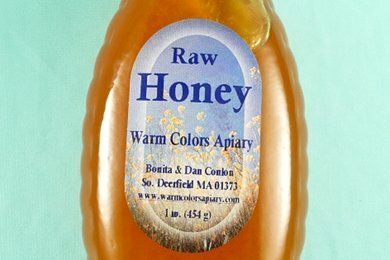Sneezing Your Way Through Spring? Try This Sweet Cure
April 29, 2010 18 Comments
Allergy season is in full swing, and most of us are feeling it. At a recent trip to Barnes & Nobles, I thought a clerk was crying before I realized he was just an allergy sufferer!

Modern medicine has come up with a series of drugs for allergy sufferers - Claritin, Flonase, Zyrtec, etc. I have tried most of these and didn't get any relief.
Not only did I still have a whopping sinus headache, but I had spent a bunch of cash on these drugs. I do a nasal rinse that gives me a little relief - but I still wake up with my head throbbing.
So I was watching Good Morning America, and I saw a bit about local honey. And I thought - WHY HAVEN'T I THOUGHT OF THAT?
It is so simple it is ridiculous. Local honey is made with local pollen, so you eat a little honey every day and you will lessen your symptoms.
After you start eating honey, your immune system starts to tolerate the pollen (the proteins in the pollen) and stops attacking them. Your immune system is attacking the pollen in your nasal passages and that is why you have an allergic response.
So, eat a little pollen and you can end that immune response which is causing you so much pain. It is like a natural vaccine against your allergies.
They honey has to be local because it is the local plant's pollen that you want to get into your bloodstream. I am worried that some parts of the country that might not have locally produced honey (are there honey producers in Central Park? I saw them in the Bee Movie!).
This honey in the photograph is made about 20 miles from me. I bought it at a local store and it is truly divine.
Here is a honey locator that I found:
Honey Locator
You could also learn from Bee Source and build your own bee hive and collect your own honey! (yeah, I know that seems a bit extreme)
Honey is 22 calories for a teaspoon and it is super nutritious. A 2004 study conducted by the University of California concluded that honey contains as many antioxidants as spinach, apples, oranges or strawberries.
Remember Maple Syrup? It had a bunch of zinc and manganese in it. Honey and maple syrup are both excellent sweeteners that contain nutrients.
Spread it on 100% whole grain toast, put it in your yogurt, add it to your baked goods - you just can't go wrong with this stuff.
I even came up with my own marketing slogan, "A little honey a day, keeps your sneezes away!"
How do you use honey?
Want to read about snacks?
Kale Chips
How To Pick Healthy Bread - A Toast to Toast
Have a Healthy Brownie! (a Mere 77 Calories)
How Shawn Stopped Drinking 10 Cans of Dr. Pepper per Day

18 Comments:
Andrea
Snack-Girl
Jen Maidenberg
Lisa
Lizzie
Val
Carrie
dualori
Jennifer
T.
Terena
John
Snack-Girl
April
Stan Mrak
John
Kay
LilLady